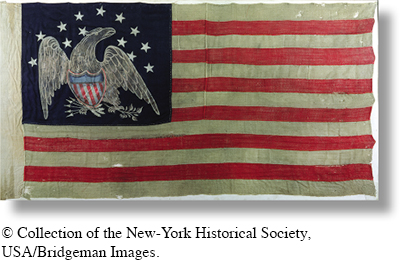The American Promise: Printed Page 197
The American Promise, Value Edition: Printed Page 183
The American Promise: A Concise History: Printed Page 210
Confederation and Taxation
Only after declaring independence did the Continental Congress turn its attention to creating a written document that would specify what powers the congress had and by what authority it existed. There was widespread agreement on key government powers: pursuing war and peace, conducting foreign relations, regulating trade, and running a postal service. Because the congress’s attention was fixed on the war, it took another year of tinkering to reach agreement on the Articles of Confederation, defining the union as a loose confederation of states existing mainly to foster a common defense. Much like the existing Continental Congress, there was no national executive (that is, no president) and no judiciary. The congress, consisting of delegates selected annually by their state legislatures, was the sole governing agency.
Delegates faced term limits of three years, to ensure rotation in office. Anywhere from two to seven delegates could represent each state, with each delegation casting a single vote. Routine decisions required a simple majority of seven states, whereas momentous decisions, such as declaring war, required nine. To approve or amend the Articles required the unanimous consent both of the thirteen state delegations and of the thirteen state legislatures—

Yet taxation was a necessity since all governments require money. To finance the Revolutionary War, the confederation congress issued interest-
The American Promise: Printed Page 197
The American Promise, Value Edition: Printed Page 183
The American Promise: A Concise History: Printed Page 210
Page 198The Articles of Confederation posed a delicate two-
The lack of authority in the confederation government was exactly what many state leaders wanted in the late 1770s. A league of states with rotating personnel, no executive branch, no power of direct taxation, and a requirement of unanimity for any major change seemed to be a good way to keep government in check. The catch was that ratification itself required unanimous agreement, and that proved difficult to secure.